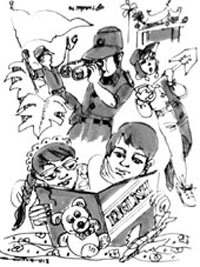|
With the summer holidays fast approaching, parents are
thinking about how to arrange a productive summer vacation for their
kids.
Nguyen Bich Ha, a mother in Ha Noi, has been asking friends and searching online for courses to enroll her son on.
"Last summer, we sent him to stay with his grandparents, but after two
weeks, they sent him back, saying he was ‘too naughty'. My husband and I
had to take turns to take him to our offices, and sometimes we left him
at home alone," she says.
Afraid that her son will spend too much
time watching TV and playing computer games, Ha is determined to send
him on a summer course.
"I am still anxious. Summer camps are
expensive, and if we send him to cheaper alternatives around the city,
transport could be a problem."
Hoang Thi Mai, a mother of two
boys, says she dares not let them stay at home, afraid that they will be
naughty and have an accident.
This summer, she plans to send them
to study chess, swimming and football, along with academic subjects at
their teacher's house. "My children's timetable is full. The holidays
can be stressful for parents and expensive, but it's something that we
have to deal with," she says.
Deciding whether to send children to extra classes during the holidays causes a headache for parents each summer.
Psychologist
Pham Duc Chuan from the Ha Noi-based Children Psychology Research
Centre says parents cannot force their children to learn subjects they
are not interested in during their time off.
"To select summer
activities for children so that they have a productive holiday, parents
should look at several criteria such as their family's conditions and
circumstances, their own wishes for what they hope their children to
achieve, and most importantly, the children's needs and abilities," he
says.
According to Chuan, even for families who cannot afford to
send their kids to summer camps, it is still possible for them to have a
constructive summer at home.
"In this case, parents need to work
out a schedule with learning-games that their children will find
interesting. You should start with small things that are easy to make
but have educational significance. For example, parents can purchase
magnifying glasses, magnets and measuring instruments for children to
study science with.
"You can give your children a small piece of
land or a box, and teach them how to hoe the soil, sow seeds and nurture
young saplings. This game helps children observe the process of how
plants grow. They can even harvest them and enjoy the fruits of their
labour."
Many parents with children aged from 11 to 15 years old
choose to send them to military boot camps where they can learn about
social values and family sentiment.
Pham My Hanh, who decided to send her son to one such camp this year, says they provide a valuable lesson.
"In
many families nowadays, parents are too busy to care for their children
full time, so the kids have a distorted view of family life. Some
children from wealthy families are spoilt, and have no respect for
money.
"I believe that my son and his friends will become more
mature and learn how to care for themselves and help their parents with
housework."
Parents have many different choices of what to do with
their children over the summer. In this era of international
interaction, I believe the best choice is learning a foreign language.
According to many parents, their first choice this summer will be to
help their children to improve their English skills.
Minh Anh, the
mother of a pupil at Language Link English centre, says: "My son's
teacher, after observing and talking with him in class, recognised that
my son loves animals, and directed me to a pretty cool app on my smart
phone that has talking animals to help my son learn English. He loves it
and enjoys learning English because he is excited by the images and
sounds that the animals make."
According to the parents of Vu Hong
Anh, winner of the first prize at the English Olympiad competition for
primary schools last year, saw that she was naturally inquisitive so
they sent her to a centre to learn drama and English. She quickly
developed a passion for her new tongue, and has been happy expanding her
vocabulary by herself ever since.
Although parents have many
different choices for their children, it is important to find a balance
between study and play so their childhoods are not lost, and by doing
so, I believe that everyone can reap the rewards.
Source: VNS
|
Thứ Ba, 28 tháng 5, 2013
Đăng ký:
Đăng Nhận xét (Atom)

Không có nhận xét nào:
Đăng nhận xét